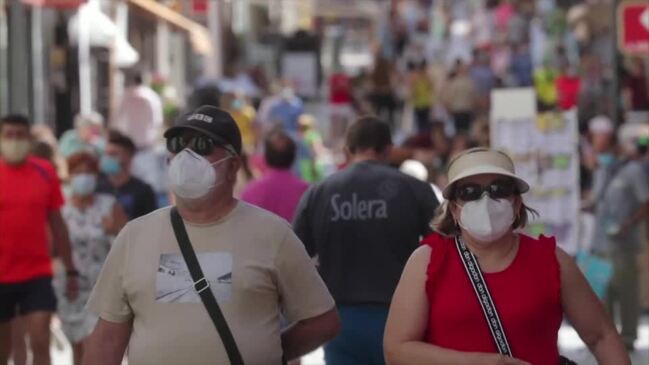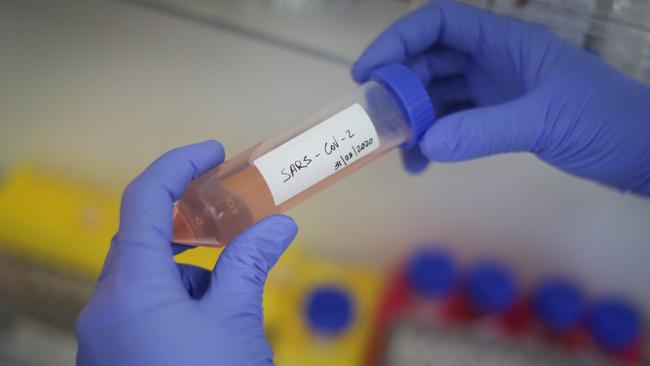‘This study is incredibly important’: Research reveals damage Covid can do to your heart
Scientists have revealed what Covid can do to the human heart and the potentially fatal consquences of an infection. It comes as Victorian Covid hospitalisations and the Eris strain rise.

Victoria
Don't miss out on the headlines from Victoria. Followed categories will be added to My News.
Covid can directly infect the arteries of your heart, causing plaque inside arteries to become inflamed and increasing the risk of heart attack and stroke, major international research shows.
It comes as the number of people with Covid in Victorian hospitals increased this week to a daily average of 168, up from 143 last week, and the highly infectious EG.5 strain — better known as Eris — has been detected in Victorian wastewater at increased levels.
Results of a U.S. National Institutes of Health funded study — published in the prestigious journal Nature Cardiovascular Research on Thursday — reveal the virus that causes Covid infects heart arteries regardless of fatty plaque levels, with potentially grave implications “for anybody who gets Covid”.
The findings helped explain why some people who contracted Covid had a greater chance of developing heart disease, a NIH summary of the research notes.

If people already had heart complications, the consequences of catching Covid could be deadly.
“Since the early days of the pandemic, we have known that people who had Covid-19 have an increased risk for cardiovascular disease or stroke up to one year after infection,” researcher Dr Michelle Olive said.
“We believe we have uncovered one of the reasons why.”
While previous studies had shown SARS-CoV-2 — the virus that causes Covid — could directly infect tissues such as the brain and lungs, less had been known about its effect on coronary arteries, she said.
The research involved taking tissue from the coronary arteries and plaque of people who had died from Covid and confirming the virus was in those tissues, as well as taking arterial and plaque cells from healthy patients and infecting them with SARS-CoV-2 in a lab dish.
Scientists found that the virus had also infected those cells and tissues.
“This study is incredibly important as it adds to the larger body of work to better understand Covid-19,” Dr Olive.
“This is just one more study that demonstrates how the virus both infects and causes inflammation in many cells and tissues throughout the body. Ultimately, this is information that will inform future research on both acute and long Covid.”
The National Institutes of Health is America’s leading medical research agency, with 27 institutes and centres and is a component of the U.S. Department of Health and Human Services.
It is the primary federal agency in the U.S. conducting medical research.

The Victorian Covid-19 Surveillance Report, updated on September 29, states “levels of SARS-CoV-2 in metropolitan wastewater catchments have increased since mid August, tracking closely with the changes in hospital admissions and suggesting higher prevalence of Covid infections in the community”.
Deaths had remained low since decreasing from the peak of Victoria’s most recent wave in June, with 58 deaths in the most recent reporting period of August 16 to September 13, 2023. However, the Victorian Health Department report notes: “Increases and decreases in the reporting of deaths attributable to Covid-19 tend to lag (behind) waves of infections and hospitalisations by several weeks.”
A mix of Omicron recombinant XBB sublineages continued to dominate in Victoria, but there was currently no evidence of increased severity for XBB subvariants, it said.
“Globally, the prevalence of EG.5 has continued to increase rapidly in recent weeks. EG.5 is a descendant lineage of XBB.1.9.2.
“EG.5 has been detected locally in Victoria since April 2023 and was detected in wastewater at increased levels during August.
“BA.2.86 is a WHO Variant Under Monitoring due to high divergence from other BA.2s. To date, there has been one detection in Australia submitted to GISAID, in Western Australia. It has not yet been detected in Victorian wastewater,” the report states.
The World Health Organsiation (WHO) began monitoring the EG.5.1. variant, derived from Omicron, on July 19.
It’s been dubbed “Eris” after the Greek god of strife and discord.



